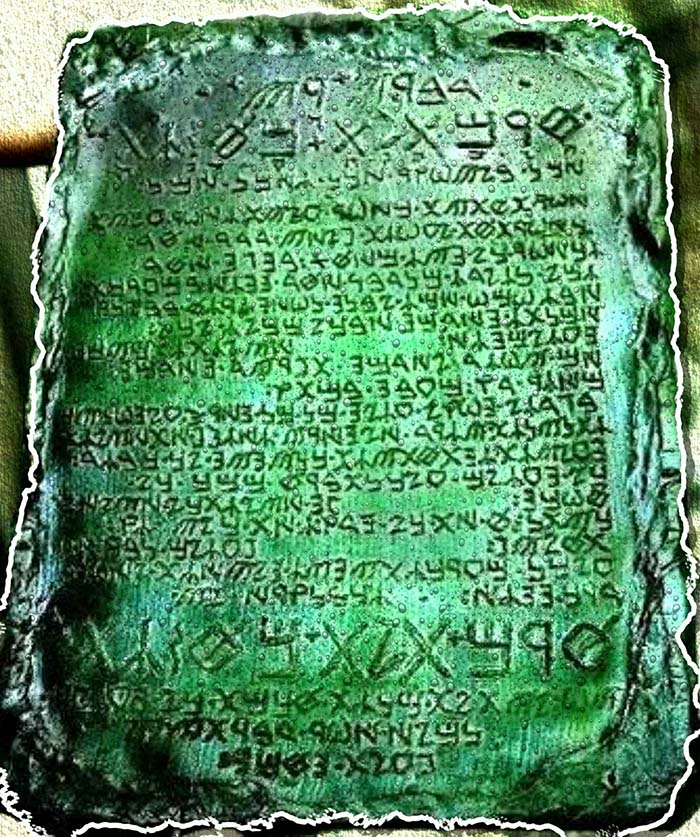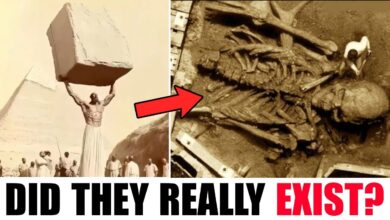Atlantis, Thoth, the Emerald Tablet & the Secret to Immortality

The Philosopher’s Stone, often considered the ultimate goal of alchemy, is a mythical substance believed to have the power to turn base metals like lead into gold and grant eternal life. According to legend, the instructions for creating this stone can be found in the *Book of Aquarius*, which claims the ingredients are common and can be found in anyone’s home, though the process itself is long and complex, potentially taking years. The book draws upon ancient texts, including the mysterious Emerald Tablet, a highly revered artifact believed to contain not only the recipe for immortality but the secrets of the entire universe.
The knowledge of the Philosopher’s Stone has been passed down through various cultures for thousands of years. Medieval alchemists inherited it from Arab scholars, who in turn got it from the Egyptians. The Egyptians, however, are said to have received this wisdom from an even older and more advanced civilization—Atlantis, a legendary island that was believed to have existed 36,000 years ago. The Emerald Tablet itself is thought to have originated from Atlantis, brought to Egypt by Thoth, an Atlantean figure who later became deified as the Egyptian god of wisdom, magic, and the moon.
During the Middle Ages and the Renaissance, alchemists across Europe were captivated by the Philosopher’s Stone. They believed that this substance could not only create gold but also restore youth and grant immortality, earning it the nickname “The Elixir of Life.” Famous minds, including Isaac Newton, dedicated their lives to studying alchemy and attempting to create the stone. Newton, in particular, spent his later years translating the Emerald Tablet, a task that consumed much of his time. Holy Roman Emperor Rudolph II, fascinated by alchemy, even funded alchemists like John Dee and Edward Kelley, giving them private laboratories to continue their work in search of the Philosopher’s Stone.
The Emerald Tablet, said to be carved out of a green, translucent material—possibly emerald or a mysterious metal called orichalcum—contained ancient wisdom believed to unlock the mysteries of life, death, and the cosmos. Thoth, who was believed to be immortal, passed this knowledge on through the Emerald Tablet, becoming a central figure in Egyptian mythology. He was credited with creating writing, hieroglyphics, and the Egyptian *Book of the Dead*. According to legend, Thoth wasn’t originally a god but rather an Atlantean scholar from the kingdom of Undal, who brought the advanced wisdom of Atlantis to Egypt following the destruction of his homeland in a great flood.
The Emerald Tablet, although lost over time, inspired the spiritual philosophy known as Hermeticism, which is based on the idea that everything in the universe is interconnected. Hermeticism influenced several secret societies, including the Freemasons and the Rosicrucians, and emphasized concepts like “As Above, So Below,” suggesting that the macrocosm of the universe reflects the microcosm of individual existence. Despite centuries of attempts to locate the original Emerald Tablet, the stone has not been found. Various legends claim it might have been buried in the Library of Alexandria, taken by the Knights Templar, or hidden in the Vatican’s secret archives.
In the early 20th century, a man named Dr. Maurice Doreal claimed to have discovered multiple tablets similar to the Emerald Tablet, but written by Thoth, in Egypt. These tablets, reportedly made of an unbreakable material, were said to contain even deeper alchemical and mystical knowledge, though they remain controversial. Doreal translated the tablets and published them under the title *The Emerald Tablets of Thoth the Atlantean*, giving rise to a new spiritual movement, the Brotherhood of the White Temple. The teachings of these tablets emphasized the idea of “The One Thing”—a cosmic energy believed to permeate all existence, binding the universe together, similar to the concept of “The Force” in *Star Wars*.
Much of the alchemical texts, including the Emerald Tablet, are shrouded in allegory and symbolism, making their true meaning difficult to interpret. Although some alchemists sought literal transformation of metals into gold, many believe the tablet and other texts point to a deeper spiritual transformation—one of enlightenment, immortality of the soul, and an understanding of the universe’s hidden forces. Despite these mystical origins, the work of early alchemists laid the groundwork for the modern science of chemistry, forever linking ancient myth with scientific progress.

*The Book of Aquarius* is a mysterious text that appeared online in 2011, claiming to reveal the secret of the Philosopher’s Stone—an alchemical substance believed to grant immortality. The anonymous author stated that the “age of Secrets is over” and provided step-by-step instructions to create the stone. This was a radical departure from the traditional alchemical texts, which used metaphors and symbolism to hide their meanings. The *Book of Aquarius* promised clarity, encouraging readers to try creating the stone themselves.
### The Philosopher’s Stone and Its Recipe
The book claims that only one ingredient is needed to create the Philosopher’s Stone: **urine**. This was not unheard of in alchemy, as bodily fluids were often thought to contain life essence. Alchemists such as Paracelsus in the 16th century believed life energy could be found in blood, hair, sweat, and waste, making the use of urine plausible within the context of ancient practices.
The process described in the *Book of Aquarius* is intricate and time-consuming, taking anywhere from three to eight years. The recipe involves distilling urine, removing impurities, and heating it over a long period. The steps are as follows:
1. **Distillation**: Urine is repeatedly distilled to remove its densest particles. This process must be repeated for months, sometimes up to a year, depending on the conditions.
2. **Separation of Salt**: Once distilled, the next step is to separate the lightest particles, which form a type of salt. This purified salt is a crucial part of the recipe.
3. **Combination and Heating**: The salt is then combined with the distilled urine and kept under constant heat. This stage takes at least a year, with the mixture undergoing several transformations:
– It first turns black (signifying putrefaction).
– It is then heated further until it turns white.
– Finally, when the temperature is increased again, the substance turns red, forming the Philosopher’s Stone.
The author of the book insisted that this stone would grant eternal life and was not merely a metaphorical concept, but a physical substance that could be created by anyone with patience and persistence.
### Online Community and Mysterious Disappearance
Shortly after the book was posted online, the anonymous author created a website where users could download it for free and participate in discussions on an online forum. A small but dedicated community of amateur alchemists formed, experimenting with the process and sharing tips, pictures, and results. Some people reported making progress, though the nature of their success remains unclear.
However, after some time, the website and its forums disappeared without explanation. This led to various theories, including that some alchemists had successfully created the stone and wanted to keep their discoveries secret. Others speculated that powerful, secretive groups like the Illuminati might have taken down the site to prevent the knowledge from spreading. While the book itself can still be downloaded from internet archives, the forum posts and discussions are no longer accessible.
### Historical Precedent: Hennig Brand and Phosphorus
The idea of creating something extraordinary from urine is not without historical precedent. In 1669, a German alchemist named **Hennig Brand** believed he could make the Philosopher’s Stone using urine. After distilling and boiling over 1,500 gallons of urine, he ended up discovering phosphorus, a glowing substance that seemed to embody the life force sought by alchemists. Though Brand did not create gold or attain immortality, his discovery was groundbreaking, reinforcing the belief that urine held special properties.
### Conclusion: A True Revelation or Elaborate Hoax?
The *Book of Aquarius* remains a mystery. Its intricate details, references to 49 ancient alchemical texts, and the community it spawned suggest it was not a simple hoax. No one has ever come forward to take credit for writing the book, and its disappearance only deepens the intrigue. Whether the recipe truly works or is merely a reflection of the centuries-old search for immortality, the *Book of Aquarius* continues to captivate those fascinated by the secrets of alchemy and eternal life.








